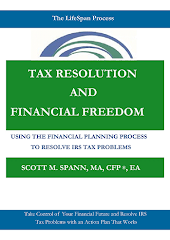It is often emphasized by financial planners that tax planning is a year round effort. For most people the April 15th filing deadline is at the center of their tax planning concerns. However, most financial planners and tax professionals agree that tax planning begins well before the due date of a personal income tax return. The implementation of an effective tax and financial plan throughout the course of the year can help one minimize the impact of taxes and make smart financial decisions. If you owe estimated taxes to the IRS the importance of having an income tax plan in place is magnified.
Do you owe the IRS or State estimated taxes?
Estimated tax is the method used to pay tax on income that is not subject to withholding. The most common examples of income resulting in estimated taxes includes self-employment income, investment income (dividends and interest), alimony, rental income, gains from the sale of assets, prizes and awards. If the amount of income tax being withheld from your salary, pension, or other income is not enough you also may have to pay estimated tax.
Who Must Pay Estimated Tax
If you had a tax liability for 2008, you may have to pay estimated tax for 2009.
General Rule
You must pay estimated tax for 2009 if both of the following apply.
1. You expect to owe at least $1,000 in tax for 2009 after subtracting your withholding and credits.
2. You expect your withholding and credits to be less than the smaller of;
- 90% of the tax to be shown on your 2009 tax return, or
- 100% of the tax shown on your 2008 tax return. Your 2008 tax return must cover all 12 months.
Many taxpayers get into trouble with tax debt due to the failure to stay current with their estimated tax payments. Some of the most common triggers of tax problems are related to major life events. These life changes may include loss of employment, business cash flow problems, and unexpected medical expenses (to name a few). Self-employed individuals are at a huge risk for estimated tax problems. I see a great deal of people who are transitioning from being a W-2 employee to self-employment struggle with making estimated tax payments. Keep in mind that the ultimate trigger of tax problems is often the lack of a holistic tax and financial plan.
The failure to make accurate and timely estimated tax payments can lead to major tax problems. If you are required to make estimated tax payments you need to follow a tax and financial plan that will prepare you for this tax obligation. Good organizational skills and budgeting is an excellent form of prevention.
Next week I will present some basic tips to help taxpayers subject to estimated tax payments stay current with their tax obligations and prevent tax problems.
Friday, July 17, 2009
Subscribe to:
Post Comments (Atom)





No comments:
Post a Comment